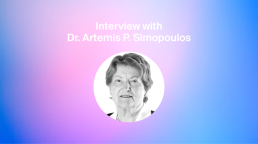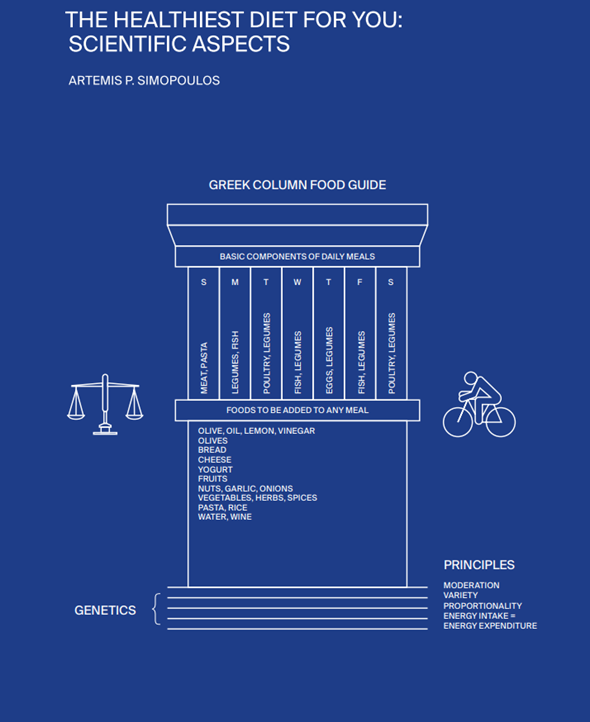
What is the Healthiest Diet for you?
Last month we wrote about MDPI books release, Five Insights for Avoiding Global Collapse, by Gaya Herrington. MDPI books strive themselves on publishing about current topics. The themes of personalized nutrition, wellness, and anti-aging have become increasingly relevant in recent years. Interesting questions are now being asked about the origins of different foodstuffs and how they affect the body. A new book published by MDPI, The Healthiest Diet for You: Scientific Aspects, touches on these themes by focusing on personalized nutrition.
Personalized nutrition is a better understanding of diet considering all aspects, including history, genetics, and scientific evidence. Genetic aspects are particularly important in diet, such as family history and predisposition to certain intolerances and conditions. This is how a diet can become personal and tailored to an individual’s genetic makeup.
Curiosity about personalized diets
The recent interest in personalized nutrition has stemmed from changes in culture, such as the increased popularity of plant-based diets. It may also be due to pressure to be kinder to the environment. In addition, people are becoming more health-conscious due to the rise of certain conditions and diseases. This includes chronic diseases such as autoimmune conditions, which can require patients to keep food diaries.
Examples of personalized nutrition
One example of personalized nutrition is the Mediterranean diet, which has received a lot of praise. It is associated with a reduced risk of high blood pressure and cholesterol, which are major risk factors for heart disease.
Moreover, it has also been thought to reduce the risk of certain diabetes complications. Research promoting the Mediterranean diet takes into consideration the evolutionary and genetic aspects of diet, and so recommends natural products and ingredients. This has many benefits, including creating a balance of essential fatty acids, omega-3, and omega-6, which were prevalent in our ancestors’ diets.
Obesity
Obesity is on the rise. In 2016, the World Health Organization found that 1.9 billion adults were overweight, and 650 million were obese. In addition, globally, from 1975 to 2016, the prevalence of overweight and obese children and adolescents aged 5-19 increased significantly, from 4 to 18%.
As a result of this, there has been an influx of trending diets and dangerous weight loss medications promoted across the Internet and social media globally by celebrities and social media influencers. Nutrition experts condemn these kinds of medication and diets that cut out major food groups, that are causing more harm than good.
What are the evolutionary and genetic aspects of diet?
The evolutionary and genetic aspects of diet are extremely important, as they affect how our genes respond, which can result in genetic variations. We now have evidence that plasma cholesterol levels affect genetic variants associated with Alzheimer’s disease, such as Apolipoprotein E4. Those with higher cholesterol levels and coronary heart disease are at a higher risk of this genetic variation and therefore Alzheimer’s disease.
This can cause a whole range of conditions or diseases. This is because our genes have not changed significantly from our preagricultural human ancestors, but our diet has. In fact, it’s estimated that our genes have only changed by as much as 0.005% in 10,000 years.
But new foods are constantly entering the market and our diets. Examples of new foods include cereal grains, dairy products, processed and ultra-processed foods, and plant-based proteins. These are foods that have recently entered the market and have not always been available to the public.
What is the healthiest diet for you?
MDPI’s latest book, The Healthiest Diet for You: Scientific Aspects, by author Dr Artemis P Simopoulos, tackles personalized nutrition, diving deep into the genetics and evolutionary aspects of diet. Dr Simopolous is a big advocate of the Mediterranean diet and stands by its advantages. In particular, she emphasizes the importance of fatty acids in diet, including omega-6 and omega-3.
This book not only provides information on what you should eat to maintain a healthy diet, but also what you should avoid. Readers can implement changes in their own lives, by swapping specific ingredients listed in the book.
As obesity is on the rise globally, the question remains: what is the healthiest diet for you?
And this is the time we should all be asking ourselves this question.
About the author

Dr Simopoulos is the founder and president of the Centre for Genetics, Nutrition, and Health. This is a non-profit educational organization in Washington DC, established in 1990.
She is a world-renowned researcher of essential fatty acids and was also a nutritional advisor for the Office of Consumer Affairs at the White House. And has edited over 60 books and journal supplements, in addition, to publishing over 370 scientific papers.
She has authored important books such as The Omega Diet: The Healing Diet. As well as this she has received many awards and has acted as a visiting professor and keynote speaker worldwide. And she has now written an excellent scientific guide to nutrition.
Interview
What was the most important element you wanted to get across in the book?
APS: I would say the most important concept that’s in the book and what makes it unique is its focus on how diet can and does affect our genetics and overall health. And this is the basis of personalized nutrition, which is a new way of looking at nutrition.
How can this book change lives?
APS: This is the only book that takes into consideration scientific evidence, and the interaction between nutrients, genes, and the environment.
Usually, when people have enough knowledge, they do make changes. This is a book for health, that’s not based on recipes, but on scientific concepts that are easy to understand. They can therefore be interpreted by the reader, who can then make the appropriate changes.
The last chapter of the book provides specific recommendations and changes that need to be made.
To summarize, this is a book that provides scientific information that leads to a better understanding of the human body and the reasons why you need to make changes. You can use your own recipes, but you must make changes in the selection of ingredients you use.
It’s how you substitute ingredients that is what is really important for health. For example, the type of meats, dairy products, and oils used, makes a huge difference to your diet.
Why was this an important book to write for you personally?
APS: I have been in the area of nutrition and genetics for many years. And I was involved in many conferences that identified a scientific basis for recombinant DNA technology. This is a technology that has expanded our knowledge of genetics and genetic variation. During my research, it immediately became very clear to me that if you’re going to improve the health of people, you need to understand where they come from, their family history, and what is unique to them.
There is very good scientific evidence using molecular biology and genetic techniques, and there is genetic variation within the population. This genetic variation is very important in relation to the evolutionary aspects of diet.
Our diet during evolution was, and is, the diet that our genes know how to respond to. Therefore, I found it absolutely necessary that we use the latest scientific information to apply this diet specifically to individuals, families, and groups that have genetic variants. As we develop new foods, we should never forget the importance of the evolutionary aspects of diet.
In your book, you made a list of ‘good’ and ‘bad’ ingredients. What were your thoughts on the concept?
APS: The whole purpose of the book is to explain the scientific aspects behind diet and nutrition. Overall, 72% of the food that we consume today was not present during evolution. These new foods are not consistent with our genes, and because of this, are creating a lot of problems in terms of assimilating what we eat to stay healthy.
Most importantly, we have made changes to fatty acids. People know about saturated fats, and they know about cholesterol, but they don’t seem to know about the two families of essential fatty acids: omega-6 and omega-3. Research has shown that during evolution, these two families of fatty acids were balanced.
In other words, we ate fruit, vegetables, fish, and meat in perfect balance. And this balance is very important because these fatty acids are found in every single cell membrane in the body: in the brain, in the heart, and in the cardiovascular system.
What is the history behind our diet?
APS: So, after the Second World War, the food industry developed a lot of oils out of seeds, such as sunflower, corn oil, soybean, etc. Historically, these oils have never been a part of our diet. They are very high in omega-6 fatty acids. The omega-6 fatty acids are pro-inflammatory. The two families of omega-6 and omega-3 have opposing properties. So, they have to be balanced. Omega-3 is found in green leafy vegetables and fish. And, depending on our genetics, some of us make more of the longer-chain fatty acids than others.
So, all of a sudden, you have a food supply that is very high in omega-6 fatty acids from all the oils being used.
Also, animals are now fed grains rather than grazing on grass, which is high in omega-3. Because of this, you end up with meat and dairy that are very high in omega-6. This imbalance is detrimental to health.
And this is why, in the book, the last chapter emphasizes the importance of making dietary changes using your own recipes but changing the ingredients so that you end up with equal amounts of omega-6 and omega-3 fatty acids, which are fundamental for good health.
What have your individual studies shown?
APS: I did my studies on the Crete diet, which is similar to the Paleolithic diet, and is a diet that is balanced in omega-6 and -3 fatty acids. We found out that in this diet, chickens eat grass, not grains. In modern diets, we feed the chicken grains, and the egg of the grain-fed chicken is thus very high in omega-6. It has a ratio of 20:1. Meanwhile, the egg from the chicken that grazes, as it did throughout evolution, has balanced omega-6 and -3.
So, we need to know and understand the importance of balance, and the food products that are available to help us to achieve this balance. This includes eggs that are balanced in omega-6 and -3, and alternative oils such as olive oil, which is low in omega-6. In addition, canola oil is high in omega-3.
So, it’s not difficult to make these kinds of changes to your diet. For example, you can start eating these oils and source grass-fed meat as opposed to grain-fed. Also, avoid frying foods, because as you fry foods, you increase the oxidation.
What is the take-home message you would like readers to learn from your book?
The fundamental concept of the book is that it’s important to make changes to have a healthy food supply that is consistent with our evolution and genetics.
The other thing I should emphasize is the fact that Western diets today are made up of 52% ultra-processed foods. These foods have been shown to be associated with obesity, diabetes, and cardiovascular disease.
The interesting thing is that ultra-processed food was developed as a result of technology, and not because of demand. These foods increase your appetite and make you take in more calories. In fact, ultra-processed foods lead to taking in about 500 more calories per day. This is due to the types of food being consumed, and the changes taking place in the molecules, which increase one’s appetite. This makes it very difficult to lose weight.
To define the healthiest diet for you, it’s important to understand your genetics by understanding your family history with food. It’s also important to understand the sources of your food, where your food comes from, and how it’s produced.
This includes being aware of new foods being brought to market, such as plant-based meats. This is something I want people to be very aware of. You can increase the plant food intake in your diet by eating salads, food, green leafy vegetables, and legumes. Legumes are high in protein; in fact, there are studies that show the more legumes you eat, the longer you live. You really ought to start with real food. You don’t need ultra-processed foods, which are already creating problems.
Book Details
If you want to read more and discover what the healthiest diet for you is, you can read Dr Artemis P Simopoulos’s book for free here. If you would like to learn more about MDPI Books and their latest releases, please visit the MDPI Books website.












The book in real sense educate about changes in our diet pattern which has lead to various ongining diseases &making a room for for new resistant diseases in near future. All nutrition should read it
Thanks for the comment Raj. Agreed, it’s a fantastic book that deserves more attention.